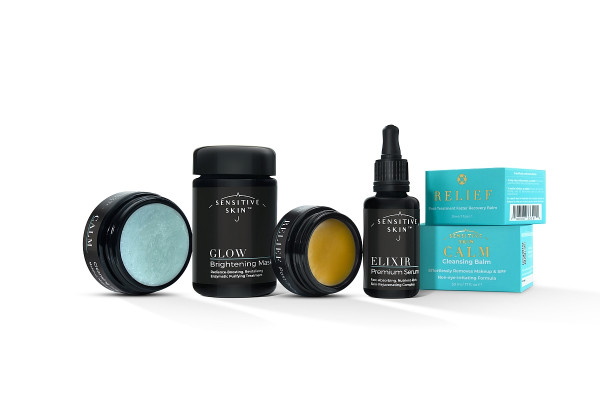This guide provides steps for creating a skincare routine for sensitive, aging skin, focusing on gentle cleansers, nourishing serums, moisturizers, sun protection, and treatments that maintain skin health without irritation.

United States, 25th Dec 2024 - Building a skincare routine for sensitive, aging skin can feel overwhelming, yet with the right approach, it's possible to maintain healthy, calm, and youthful skin. As sensitive skin ages, it requires extra gentle care and thoughtfully formulated products that won't trigger irritation or compromise the skin's delicate barrier. This guide will help you build an effective routine that balances sensitivity with anti-aging needs, using proven approaches and carefully selected products.
1. Start with a Gentle, Nurturing Cleanser
Think of cleansing as laying the foundation for skin's daily harmony. For sensitive, aging skin, the key is to choose a cleanser that respects the skin's natural balance while effectively removing impurities. Avoid harsh soaps or strong foaming cleansers, as these can compromise the skin barrier and trigger irritation.
Pro Tip: Look for cleansers enriched with soothing ingredients like Blue Tansy Oil, Bisabolol, and Elderberry Extract. For example, SENSITIVE SKIN brand's CALM Nourishing Cleansing Balm transforms from a luxurious balm to a gentle cleansing milk, demonstrating how a well-formulated cleanser can remove impurities while maintaining skin's protective barrier. The best cleansers for sensitive skin feel like a calming embrace rather than a stripping sensation.
2. Create Balance with a Hydrating Toner
While many see toning as optional, for sensitive aging skin, it's an opportunity to begin the healing process. A good toner acts as a peacemaker between cleansing and treatment steps—restoring skin's natural pH balance and preparing it to receive the nurturing ingredients that follow.
Pro Tip: Choose alcohol-free formulas enriched with soothing botanicals like chamomile, calendula, or green tea extract. Apply by gently pressing into the skin with clean hands, allowing each layer to be fully absorbed. Sensitive skin responds best to gentle, mindful applications—never tug or rub.
3. Nourish with a Carefully Crafted Serum
This step can make all the difference between irritation and transformation for sensitive, aging skin. With recent EU restrictions on retinol highlighting potential risks, it's more important than ever to choose serums wisely.
Pro Tip: Look for serums that feature gentle retinol alternatives like bakuchiol, which delivers powerful anti-aging benefits without irritation. For example, SENSITIVE SKIN brand's award-winning ELIXIR Premium Serum (Beauty Shortlist 2024, Clean Certified 2024) combines 32 nutrient-rich botanicals specifically formulated for sensitive skin. The best serums will balance effectiveness with gentleness—as evidenced by one ELIXIR user who reported, "I've tried the premium serum and immediately fell in love. I've been using it every day since then, and I love how it transformed my skin."
4. Protect with a Nourishing Moisturizer
Moisturizing is essential for sensitive, aging skin as it helps strengthen and protect the skin's natural barrier. The ideal moisturizer should provide deep hydration without feeling heavy or causing congestion. Think of it as creating an invisible shield that locks in all the beneficial ingredients while defending against environmental stressors.
Pro Tip: Look for moisturizers containing barrier-supporting ingredients like ceramides, squalane, and natural oils. These ingredients help repair and strengthen the skin's protective layer while providing lasting hydration. The formula should be free from artificial fragrances and harsh preservatives to minimize the risk of irritation.
5. Prioritize Safe Sun Protection
Sunscreen is non-negotiable in any anti-aging skincare routine, particularly for sensitive skin. UV exposure can accelerate aging and exacerbate sensitivity issues, making proper sun protection crucial for skin health.
Recent research has raised concerns about chemical sunscreen ingredients and their potential health impacts. Mineral-based sunscreens, which create a physical barrier on the skin's surface, offer a safer alternative without compromising on protection. For daily use, choose a broad-spectrum mineral sunscreen with SPF 30 or higher that contains zinc oxide or titanium dioxide.
Pro Tip: Apply sunscreen as the final step in your morning routine, and reapply every two hours when outdoors. For sensitive skin, look for formulas that include additional soothing ingredients like niacinamide or green tea extract.
6. Incorporate Weekly Treatments
Regular gentle treatments can enhance your skincare routine's effectiveness without overwhelming sensitive skin. The key is choosing treatments that provide benefits without causing irritation.
Pro Tip: Consider enzyme-based masks that offer gentle exfoliation while supporting skin health. SENSITIVE SKIN brand's GLOW Brightening Mask exemplifies this approach, combining natural enzymes and minerals to brighten and refine skin texture without harsh scrubbing. As one user noted, "It cleans your skin well and does it ever so gently, leaving generous gifts of enzymes and minerals that feel like kisses."
7. Support Post-Treatment Recovery
For those who undergo professional skin treatments or procedures, having a proper recovery routine is essential. The post-treatment period requires extra gentle care to support healing and optimize results.
Pro Tip: SENSITIVE SKIN brand's RELIEF Post-Treatment Recovery Balm demonstrates how recovery products should be formulated—with ingredients like Balloon Vine Extract, Murumuru Butter, and Green Algae that help reduce inflammation and support skin barrier repair. This type of product is particularly valuable for maintaining skin health between professional treatments.

8. Embrace Antioxidant Protection
Antioxidants play a crucial role in protecting sensitive, aging skin from environmental damage. However, traditional forms of certain antioxidants, like L-ascorbic acid (Vitamin C), can sometimes irritate sensitive skin.
Pro Tip: Look for products containing gentler forms of antioxidants, such as sodium ascorbyl phosphate or tetrahexyldecyl ascorbate. These derivatives provide similar benefits with less potential for irritation. Natural antioxidant sources like green tea extract and pomegranate can also offer effective protection while soothing the skin.
9. Allow Adaptation Time
When introducing new products into a sensitive skin routine, patience is essential. Start with one new product at a time, using it every other day or even less frequently at first. This approach allows you to clearly identify how your skin responds to each addition.
Pro Tip: Keep a skincare journal to track how your skin reacts to new products. Note any changes in sensitivity, hydration levels, or overall skin appearance. This information can be invaluable in fine-tuning your routine.
10. Listen to Your Skin's Needs
Sensitive skin can be particularly reactive to changes in environment, stress levels, and hormones. A successful skincare routine should be flexible enough to accommodate these variations while maintaining consistent support for the skin's health.
Final Note
The key to caring for sensitive, aging skin lies in choosing products that prioritize gentle effectiveness over harsh active ingredients. Look for brands that specifically formulate for sensitive skin, using clean, minimal ingredients that support the skin's natural functions. By following these guidelines and paying attention to how your skin responds, you can develop a routine that helps maintain healthy, comfortable, and radiant skin at any age.
Media Contact
Organization: PR Media House
Contact Person: Jake Parker
Website: https://prmediahouse.com/
Email: Send Email
Country:United States
Release id:21917
The post How to Build a Skincare Routine for Sensitive, Aging Skin appeared first on King Newswire. It is provided by a third-party content provider. King Newswire makes no warranties or representations in connection with it.



